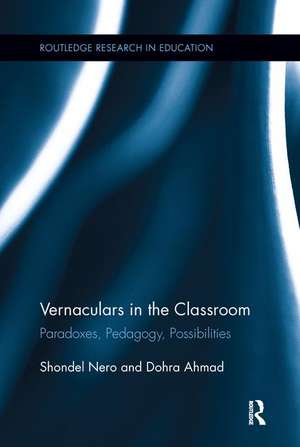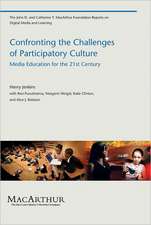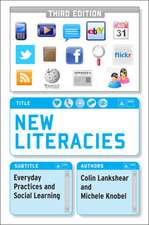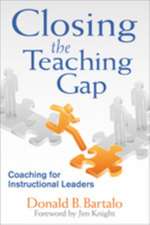Vernaculars in the Classroom: Paradoxes, Pedagogy, Possibilities: Routledge Research in Education
Autor Shondel Nero, Dohra Ahmaden Limba Engleză Paperback – 18 noi 2016
In Part II, the authors provide pedagogical case studies using literary texts written in vernacular Englishes from around the world. Each chapter examines a vernacular-related topic, and concludes with discussion questions and writing assignments; an appendix contains the poems and short stories discussed, and other teaching resources. The book provides a model of interdisciplinary inquiry that can be beneficial to scholars and practitioners in composition, literature, and applied linguistics, as well as students of all linguistic backgrounds.
| Toate formatele și edițiile | Preț | Express |
|---|---|---|
| Paperback (1) | 376.10 lei 6-8 săpt. | |
| Taylor & Francis – 18 noi 2016 | 376.10 lei 6-8 săpt. | |
| Hardback (1) | 1217.29 lei 6-8 săpt. | |
| Taylor & Francis – 10 iun 2014 | 1217.29 lei 6-8 săpt. |
Din seria Routledge Research in Education
-
 Preț: 310.29 lei
Preț: 310.29 lei -
 Preț: 304.19 lei
Preț: 304.19 lei -
 Preț: 303.18 lei
Preț: 303.18 lei -
 Preț: 147.15 lei
Preț: 147.15 lei -
 Preț: 276.13 lei
Preț: 276.13 lei -
 Preț: 302.17 lei
Preț: 302.17 lei -
 Preț: 303.75 lei
Preț: 303.75 lei -
 Preț: 290.73 lei
Preț: 290.73 lei -
 Preț: 310.31 lei
Preț: 310.31 lei - 8%
 Preț: 381.60 lei
Preț: 381.60 lei -
 Preț: 304.83 lei
Preț: 304.83 lei -
 Preț: 377.85 lei
Preț: 377.85 lei -
 Preț: 401.01 lei
Preț: 401.01 lei -
 Preț: 310.65 lei
Preț: 310.65 lei -
 Preț: 303.89 lei
Preț: 303.89 lei -
 Preț: 129.83 lei
Preț: 129.83 lei -
 Preț: 310.08 lei
Preț: 310.08 lei -
 Preț: 310.22 lei
Preț: 310.22 lei -
 Preț: 294.39 lei
Preț: 294.39 lei - 8%
 Preț: 381.99 lei
Preț: 381.99 lei - 9%
 Preț: 867.43 lei
Preț: 867.43 lei - 9%
 Preț: 1003.95 lei
Preț: 1003.95 lei -
 Preț: 303.89 lei
Preț: 303.89 lei -
 Preț: 358.67 lei
Preț: 358.67 lei - 8%
 Preț: 389.47 lei
Preț: 389.47 lei - 18%
 Preț: 1060.52 lei
Preț: 1060.52 lei - 18%
 Preț: 1116.74 lei
Preț: 1116.74 lei -
 Preț: 397.75 lei
Preț: 397.75 lei - 18%
 Preț: 1221.80 lei
Preț: 1221.80 lei - 18%
 Preț: 1110.74 lei
Preț: 1110.74 lei - 18%
 Preț: 1053.92 lei
Preț: 1053.92 lei - 18%
 Preț: 1162.84 lei
Preț: 1162.84 lei - 18%
 Preț: 1063.65 lei
Preț: 1063.65 lei - 28%
 Preț: 851.82 lei
Preț: 851.82 lei - 18%
 Preț: 1054.75 lei
Preț: 1054.75 lei - 18%
 Preț: 1054.58 lei
Preț: 1054.58 lei - 18%
 Preț: 1178.85 lei
Preț: 1178.85 lei - 18%
 Preț: 1111.72 lei
Preț: 1111.72 lei - 18%
 Preț: 1057.75 lei
Preț: 1057.75 lei -
 Preț: 489.03 lei
Preț: 489.03 lei - 18%
 Preț: 1059.14 lei
Preț: 1059.14 lei - 18%
 Preț: 1050.09 lei
Preț: 1050.09 lei - 18%
 Preț: 1060.52 lei
Preț: 1060.52 lei - 18%
 Preț: 1062.98 lei
Preț: 1062.98 lei - 18%
 Preț: 1056.28 lei
Preț: 1056.28 lei - 18%
 Preț: 1217.63 lei
Preț: 1217.63 lei - 18%
 Preț: 1060.19 lei
Preț: 1060.19 lei - 18%
 Preț: 1170.84 lei
Preț: 1170.84 lei - 18%
 Preț: 1167.36 lei
Preț: 1167.36 lei
Preț: 376.10 lei
Nou
Puncte Express: 564
Preț estimativ în valută:
71.97€ • 78.15$ • 60.46£
71.97€ • 78.15$ • 60.46£
Carte tipărită la comandă
Livrare economică 23 aprilie-07 mai
Preluare comenzi: 021 569.72.76
Specificații
ISBN-13: 9781138286818
ISBN-10: 1138286818
Pagini: 228
Ilustrații: 8 Tables, black and white
Dimensiuni: 152 x 229 x 12 mm
Greutate: 0.45 kg
Ediția:1
Editura: Taylor & Francis
Colecția Routledge
Seria Routledge Research in Education
Locul publicării:Oxford, United Kingdom
ISBN-10: 1138286818
Pagini: 228
Ilustrații: 8 Tables, black and white
Dimensiuni: 152 x 229 x 12 mm
Greutate: 0.45 kg
Ediția:1
Editura: Taylor & Francis
Colecția Routledge
Seria Routledge Research in Education
Locul publicării:Oxford, United Kingdom
Public țintă
Postgraduate and UndergraduateCuprins
Part I: Vernacular Englishes: Crossroads of Linguistics and Literature
1. Introduction
2. Vernacular Language and Literature: Myths and Paradoxes
3. Vernacular Use in School: Evolution of Responses and Related Challenges
4. Pedagogical Possibilities
Part II: Texts and Topics: Case Studies for Teaching
5. Canonicity and Intertextuality: Louise Bennett, "Bans O’Killing" and Sapphire, Push
6. Authenticity: Zora Neale Hurston, "Story in Harlem Slang" and Paul Keens-Douglas, "Wukhand"
7. Code-switching: John Kasaipwalova, "Betel Nut is Bad Magic for Airplanes"; Louise Bennett, "Colonisation in Reverse"; Patricia Grace, "Letters from Whetu"; and Others
8. Delegitimization: Mark Twain, "A True Story Repeated Word for Word as I Heard It"
9. Form and Formal Innovation: Roddy Doyle, The Snapper
10. Conclusion
1. Introduction
2. Vernacular Language and Literature: Myths and Paradoxes
3. Vernacular Use in School: Evolution of Responses and Related Challenges
4. Pedagogical Possibilities
Part II: Texts and Topics: Case Studies for Teaching
5. Canonicity and Intertextuality: Louise Bennett, "Bans O’Killing" and Sapphire, Push
6. Authenticity: Zora Neale Hurston, "Story in Harlem Slang" and Paul Keens-Douglas, "Wukhand"
7. Code-switching: John Kasaipwalova, "Betel Nut is Bad Magic for Airplanes"; Louise Bennett, "Colonisation in Reverse"; Patricia Grace, "Letters from Whetu"; and Others
8. Delegitimization: Mark Twain, "A True Story Repeated Word for Word as I Heard It"
9. Form and Formal Innovation: Roddy Doyle, The Snapper
10. Conclusion
Recenzii
"This is a much needed publication that translates current scholarly realizations about global English for instructional purposes." -- Suresh Canagarajah, Pennsylvania State University, USA
"Nero and Ahmad show that there is no conflict between using vernacular and so-called standard English in the classroom. Indeed, the authors explicitly ask for teaching that helps students master "standard" written English, while still inviting them to write often in the vernacular. This is an important and valuable book." -- Peter Elbow, University of Massachusetts, USA
"This book offers a fresh and exciting new look at vernacular Englishes from the perspective of literary studies and of vernacular literary texts from the perspective of applied linguistics. Deftly addressing questions of both language and literature, it provides an invaluable synthesis of disciplinary paradigms, with urgent implications for how we read and teach vernacular texts from around the world." -- Jahan Ramazani, University of Virginia, USA
"This is a book that demonstrates the intellectual, creative, and cultural benefits of engaging the vernacular in the classroom, rather than outlawing or ignoring it. Among the many virtues of this innovative book is that it combines linguistics and literature, theory and application. The pedagogical case studies, virtually ready for classroom use, are especially valuable." -- John Rickford, Stanford University, USA
"This pioneering, visionary work reflects the curricular innovations and pedagogical strategies that these two gifted scholar-teachers have developed over the years and tested in the crucible of the classroom. At long last, the language-literature paradigm is shifting, and Nero and Ahmad’s Vernaculars in the Classroom is leading the way. Go head wit yall bad self!"-- Geneva Smitherman, Michigan State University, USA
"Nero and Ahmad’s brilliant book shows us that vernacular language is a powerful tool that not only expresses meaning as fully as any "standard" language, but authenticates its speakers and creates sophisticated stylistic effects." -- Sandra Wilde, Hunter College, USA"Vernaculars in the Classroom: Paradoxes, Pedagogy, Possibilities, by Shondel Nero and Dohra Ahmad, represents a unique instance of interdisciplinary research. The two authors, a linguist and a scholar of literature, unite their experiences and interests in vernacular expression to create an invaluable resource that exposes the myths and paradoxes that permeate the use of vernacular languages in schools. Concurrently, it offers answers and practical strategies for teachers to critically engage vernaculars in knowledge construction." – Maria Cecilia Schwedhelm, Language and Education Journal, 2016
"Nero and Ahmad show that there is no conflict between using vernacular and so-called standard English in the classroom. Indeed, the authors explicitly ask for teaching that helps students master "standard" written English, while still inviting them to write often in the vernacular. This is an important and valuable book." -- Peter Elbow, University of Massachusetts, USA
"This book offers a fresh and exciting new look at vernacular Englishes from the perspective of literary studies and of vernacular literary texts from the perspective of applied linguistics. Deftly addressing questions of both language and literature, it provides an invaluable synthesis of disciplinary paradigms, with urgent implications for how we read and teach vernacular texts from around the world." -- Jahan Ramazani, University of Virginia, USA
"This is a book that demonstrates the intellectual, creative, and cultural benefits of engaging the vernacular in the classroom, rather than outlawing or ignoring it. Among the many virtues of this innovative book is that it combines linguistics and literature, theory and application. The pedagogical case studies, virtually ready for classroom use, are especially valuable." -- John Rickford, Stanford University, USA
"This pioneering, visionary work reflects the curricular innovations and pedagogical strategies that these two gifted scholar-teachers have developed over the years and tested in the crucible of the classroom. At long last, the language-literature paradigm is shifting, and Nero and Ahmad’s Vernaculars in the Classroom is leading the way. Go head wit yall bad self!"-- Geneva Smitherman, Michigan State University, USA
"Nero and Ahmad’s brilliant book shows us that vernacular language is a powerful tool that not only expresses meaning as fully as any "standard" language, but authenticates its speakers and creates sophisticated stylistic effects." -- Sandra Wilde, Hunter College, USA"Vernaculars in the Classroom: Paradoxes, Pedagogy, Possibilities, by Shondel Nero and Dohra Ahmad, represents a unique instance of interdisciplinary research. The two authors, a linguist and a scholar of literature, unite their experiences and interests in vernacular expression to create an invaluable resource that exposes the myths and paradoxes that permeate the use of vernacular languages in schools. Concurrently, it offers answers and practical strategies for teachers to critically engage vernaculars in knowledge construction." – Maria Cecilia Schwedhelm, Language and Education Journal, 2016
Descriere
Drawing on the intersection of applied linguistics and literature, this book explores productive uses of vernacular Englishes in secondary and university classrooms. Part I examines the historical devaluing of vernaculars, including the paradoxes surrounding vernacular use. Part II offers five teaching case studies using literary texts written in vernacular Englishes.













